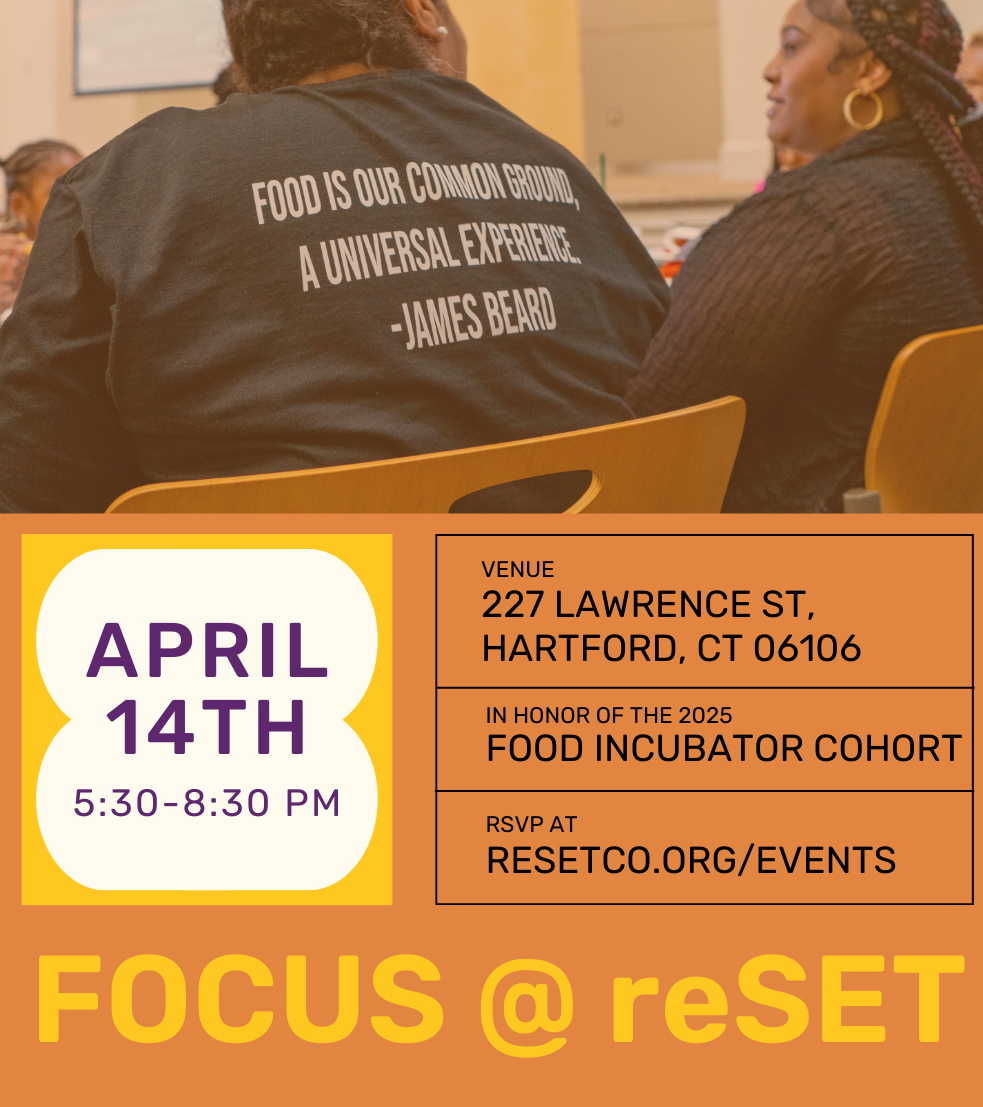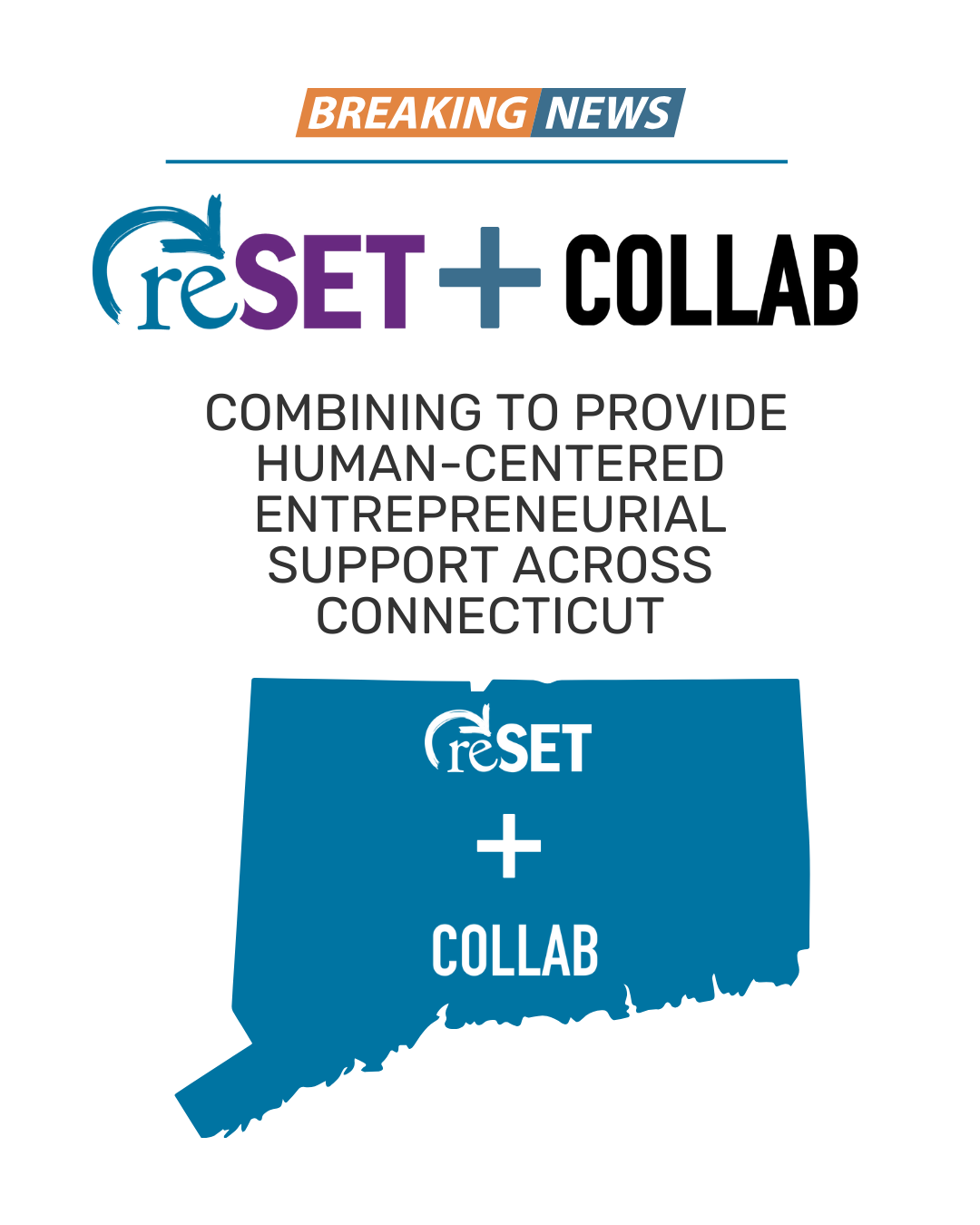reSET interns, from left, Kay Wilcox, Freddy Santiago and Guelory Brutus, all of University of Connecticut, present their pitch at the nonprofit’s intern innovation challenge Aug. 17. (Rebecca Lurye/Hartford Courant)
HARTFORD — For about 10 minutes, three entrepreneurs rattled off details of their plan to sell refugee-made tote bags in the digital marketplace.
Initial designs would take two to three months to finalize and bags eventually would sell for $10 on Etsy.com, they told two judges and a room full of potential investors who gathered Thursday night to hear their pitch.
Yes, they have a contact on the ground at a refugee camp in Greece, which has sewing machines and other infrastructure in place to begin production. No, international trade regulations on textiles are not hard to navigate as long as they avoid leather goods.
But then a judge asked a question that stumped the start-up: How would they transfer money to their artisans in Greece?
“We don’t know that yet,” said Freddy Santiago, a nervous smile spreading across the University of Connecticut student’s face. “It’s been six weeks.”
Santiago was one of nine summer interns at reSET, a social enterprise nonprofit in Hartford’s Parkville neighborhood. And GERE, the business he developed with interns Kay Wilcox and Guelory Brutus, also of UConn, wasn’t real — at least not yet.
It was the product of reSET’s first intern innovation challenge in which the summer’s cohort was divided into three teams, each assigned a real-world problem that the organization determined was not being adequately addressed in the state of Connecticut. The teams had about 10 hours per week over six weeks to become entrepreneurs.
From left, reSET interns Collette Grimes, Zachary Cromwell and Justin Simko present their business plan at the intern innovation challenge showcase on Aug. 17. (Rebecca Lurye/Hartford Courant)
GERE, Thursday’s winning team, sought to support refugees by partnering with an existing organization in a Greek camp.
EverBloom, the runner up, pitched a plan to sell high-end potted plans wholesale, produced by people transitioning out of mental health facilities — horticulture being a recognized form of therapy for disorders like post-traumatic stress, depression and anxiety
And Tech Donor developed a business plan to refurbish and recycle technology cast off by local businesses to keep the equipment out of landfills and, when possible, get it into the hands of nonprofits with measly technology budgets.
While reSET has held summer internships the past two years, this was the first time it not only paired students with local startups and gave them professional development, but asked the interns themselves to form a business from the ground up.
From left, reSET interns Thomas ropes, Jill Howard and Aiswarya Arul present a pitch at the intern innovation challenge showcase on Aug. 17. (Rebecca Lurye/Hartford Courant)
As a prize, Santiago, Wilcox and Brutus each won membership to reSET and free legal, financial and marketing advice.
Programs manager Jeremy Szechenyi said the intern challenge was not about winning. And it wasn’t about building viable businesses, though each of the teams very nearly did just that.
“Our main goal is to not necessarily create companies,“ he said. “That would be a wonderful secondary effect. Our goal is to really immerse these interns in the experience of early stage entrepreneurship and prepare them to go out one day and, if they have an opportunity, to take it and be a little more prepared.”
They also sought to immerse the interns in Hartford through excursions throughout the city, led by managing director Ojala Naeem.
Some of those activities are tailored to out-of-state interns Aiswarya Arul and Jill Howard, who came from Babson College in Boston and University of New Hampshire, but even some of the local students from UConn, University of Hartford and Trinity College said their opinions of the city have changed.
“I didn’t want to be in Hartford to begin with,” said Justin Simko, a UHart senior. “Then I’m here, and you realize it’s such a great community.”
Szechenyi said reSET relies on that kind of thinking to support its pipeline — interns joining the organization as full-fledged members, forming startups and then taking on interns of their own to offer mentorship and opportunities.
“There are hotbeds for entrepreneurship in the country that have higher volume of startups and money but you don’t necessarily have to be in those centers to be successful,” Szechenyi said. “There are lot of other factors that come into play.”
To date, reSET has graduated 29 interns that contributed more than 5,000 project hours to 50 startups, Naeem said. She was proud Thursday watching the latest cohort join their ranks.
“They’re real entrepreneurs,” she said.








